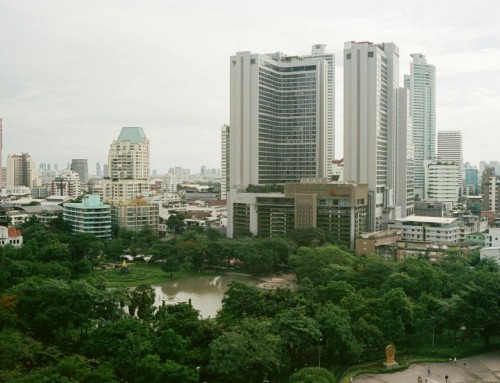Thailand has often been seen as a popular investment destination. It is strategically located in the centre of South East Asia and is commonly seen as a gateway for China and the rest of the world to the region. It does help that Thailand is a very open economy to the rest of the world. This is evident when considering among South East Asian countries, it has the second highest number of free trade agreements (FTAs) signed with the rest of the world. Thailand has 23 FTAs, equal with Malaysia and only bettered by Singapore with 36. In contrast, neighbouring Cambodia has 8, the Philippines has 11, Vietnam has 17 and Indonesia has 20.
Here is a summary of the FTAs that Thailand has to date.
- Thailand-Bahrain Free Trade Agreement
- Bay of Bengal Initiative for Multi-Sectoral Technical and Economic Cooperation (BIMSTEC) Free Trade Area
- India-Thailand Free Trade Area
- Pakistan-Thailand Free Trade Agreement
- Regional Comprehensive Economic Partnership
- Thailand-European Free Trade Association Free Trade Agreement
- Thailand-European Union Free Trade Agreement
- Thailand-Turkey FTA
- United States-Thailand Free Trade Agreement
- ASEAN-Hong Kong, China Free Trade Agreement
- ASEAN Free Trade Area
- ASEAN-Australia and New Zealand Free Trade Agreement
- ASEAN-India Comprehensive Economic Cooperation Agreement
- ASEAN-Japan Comprehensive Economic Partnership
- ASEAN-People’s Republic of China Comprehensive Economic Cooperation Agreement
- ASEAN-[Republic of] Korea Comprehensive Economic Cooperation Agreement
- Japan-Thailand Economic Partnership Agreement
- Laos-Thailand Preferential Trading Arrangement
- People’s Republic of China-Thailand Free Trade Agreement
- Thailand-Australia Free Trade Agreement
- Thailand-Chile Free Trade Agreement
- Thailand-New Zealand Closer Economic Partnership Agreement
- Thailand-Peru Free Trade Agreement
Notable FTAs in this list of 23 would be those with India, the United States, the European Union and of course China.
Another encouraging sign for would-be investors would be that Thailand is ranked 26th in the World Bank’s Ease of Doing Business report. Despite this relatively high rating, the Thai government has been making strides to try to further improve on this, coming up with schemes to attract investors to consider investing in the kingdom. This is evident in their push towards investment in technology and knowledge-based industries with the launch of the SMART Visa program in early 2018.
There are many types of visas which you can obtain to stay in Thailand but in this article, I will narrow down the discussion to three. The Investment and Business (IB) Visa, the SMART Visa and the THB 10 Million Investment Visa.
The Investment and Business Visa
This visa is issued to foreign nationals working on investment projects that are approved by the Board of Investment of Thailand.
Requirements:
- Proof that the investor possesses sufficient finances to support the investor during the stay in the country.
- A letter from the company that states the investor’s position in the company, duration of employment, salary and purpose for coming to Thailand.
- Correspondences with Thai business partners
- An invitation letter from the Thai company to the investor.
- The Thai company’s corporate documents.
Privileges:
- An initial three-month IB visa that can be extended in yearly increments after the initial period.
- The investor can qualify for permanent residency if he or she has held the IB visa for at least three consecutive years. The permanent residency application will also be subject to other requirements like having investments and not having violated any Thai criminal or immigration laws.
The SMART Visa
This visa was approved by the Thai cabinet on the 16th of January 2018. The SMART Visa is designed to attract highly skilled manpower as well as investments into a few targeted industries. For the purpose of this article, we will zoom in on the SMART “I” Visa or SMART Investor Visa.
Requirements:
- The applicant will need to invest directly in one or more companies in Thailand using technology as a base in manufacturing or services. These companies must be in the targeted industries as determined by the Thailand Board of Investment.
- The investment amount must be at least THB 20 million.
- The investment must be maintained throughout the validity period of the SMART Visa.
Privileges:
- Minimum 4-year visa.
- No work permit required to work in the endorsed companies.
- The 90-day reporting requirement is extended to 1-year.
- No re-entry permit is required.
- Spouses and children will be granted permission to stay in Thailand.
- Spouses will be granted permission to work in Thailand without the need for a work permit. (The job must not be on the prohibited list of occupations and professions for foreigners.)
To find out more, you can visit the Thailand Board of Investment website.
The THB 10 Million Investment Visa
This is the visa property investors may be interested to apply for especially if they are younger than 50 years of age. For those that are 50 years of age and above, they can apply for a Retirement Visa in Thailand. This particular visa program is designed by the Thai government to stimulate the property and bond markets and also to encourage international investors to consider Thailand as a viable investment destination.
Requirements:
- Invest a minimum of THB 10 million
- The THB 10 million can be spread across either a condominium unit in a newly built development, Thai government or Thai state-enterprise bonds or in the form of deposits in a Thai bank account.
Privileges:
- No age restrictions
- The investor’s family is also eligible for the visa
It must be noted that the visa does not allow the investor to work in Thailand and he or she can only apply if already holding a non-immigrant visa. I have briefly covered non-immigrant visa in an earlier article, how to get a retirement visa in Thailand. Moreover, the THB 10 Million Investment Visa only restricts property investments to condominium units.
Investing in Thailand can be a gateway for an investor to obtain a visa to stay in Thailand for an extended period of time. As an investment destination, Thailand is a very promising and intriguing proposition. Located right in the heart of South East Asia, the Chinese clearly view Thailand, and namely Bangkok, as the epicentre for expansion into the region through the One Belt One Road initiative. The Thai government is also expanding Bangkok’s rail network and attracting many foreign investments into the Kingdom through various schemes.
Yours Sincerely,
My other articles about Thailand property
Where are the up and coming property investment locations in Bangkok?
The good locations for property investment in Bangkok
A compelling case to invest in Bangkok
Guide to buying a property in Thailand
Thailand Property: Legal and Tax Issues
Recognising the different property title deeds in Thailand
Can a foreigner take a property loan in Thailand?
Buying property in Bangkok: Payment procedures
A guide to the top property developers in Thailand
Thailand Property Market Outlook for 2018
Thailand as a retirement destination
How to get a Retirement Visa in Thailand
My personal experience purchasing a property in Bangkok
Things to take note when investing in an overseas property
Factors that determine the property price in Bangkok
Looking to buy a Bangkok condo? Things to take note of.
Thailand property inheritance laws: taxes, succession and wills






